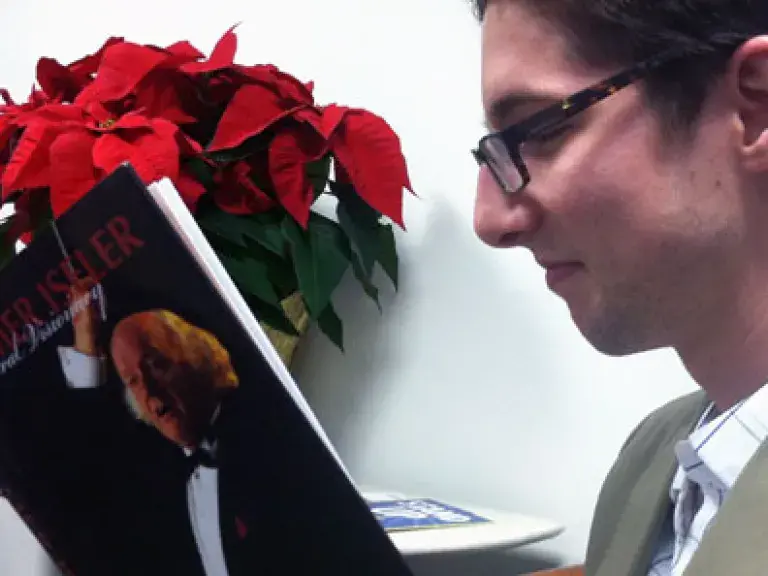
It was in 1972, while still a music student, that I first heard the Festival Singers of Canada under Elmer Iseler's direction. I remember the luminous sound, the challenging repertoire, the dramatic conducting, and the inspiring performance. For this aspiring young conductor, the experience was transforming. That was my first encounter with Elmer Iseler, and little did I know then that our paths would continue to cross and combine as my own freelance conducting career and work at the Canadian Broadcasting Corporation brought us together in many wonderful ways, both professional and collegial.
Like most men of huge achievement and pioneering spirit, Elmer Iseler was a complicated man. Walter Pitman, in his book, Elmer Iseler, Choral Visionary (excerpted below), traces with sensitivity, insight, and keen perception Iseler's life and contribution as Canada's foremost choral musician and conductor. It's the story of a man: his music, his joys, his hurts, and how inextricably bound his life was with his passionate love of country. This is not just a Canadian story. It is also about the choral art and Iseler's enormous influence on the art, both here and abroad.
—Robert Cooper; artistic director of Chorus Niagara and Orpheus Choir of Toronto
__________________
Often a strong and talented musician can bring into focus a new enthusiasm for a particular musical form, but rarely does a single person enhance the full spectrum of a musical genre across the breadth of an entire country as Elmer Iseler did in his relentless pursuit of excellence in choral presentation during the last decades of the 20th century.
There is no parallel to Elmer Iseler's role in challenging and changing the context of choral music in Canada. Before his arrival on the scene such performance was essentially to be found in two areas—both drawn from the dominance of the United Kingdom over its far-flung colony. One was the church choir stall, from which music was produced every Sunday morning to enhance the quality and intensity of divine worship.
The second major influence was the 19th-century British oratorio choir movement brought across the Atlantic by immigrants to Canada from the old country. Their delight in singing in large choral ensembles inspired replication in their new homeland.
Elmer Iseler drew strength from both of these traditions. Through his high expectations of a distinctive quality of tone, balance, and blend, the standards of choral music performance in every province of Canada were perceptibly changed. He transformed the quality of music expression in both the choir stall and the concert hall, raising the expectations of parishioners and the concertgoing public alike. Through his commitment to workshops directed at both choristers and choral conductors, both small choirs and eventually larger choral ensembles were influenced. Canadian choral music was never to be the same again.
From this transformation in the sound and competency of choral ensembles came the understanding that singers were indeed musicians who deserved recompense for their efforts. The concept of a truly professional choir working year after year to improve itself consistently and to address new repertoire constantly was Elmer's dream that eventually became reality, not only in Toronto, but under other conductors in Montreal and Vancouver and beyond.
Elmer Iseler realized that musical expression must speak to the lives of men and women facing the challenges of the century in which they lived. He realized that if music was to be a vital, dynamic influence on people's beliefs and behaviours, there must be compositions in the repertoire of every chorus written by contemporary composers who shared the mysteries of living in a modern age with both choristers and their audiences. He encouraged creators of music to address these issues of human alienation, injustice and inequality, peace and war, into their choral efforts. They would do so in the knowledge that their work would be superbly performed by the Festival Singers or, later, the Elmer Iseler Singers, and if demanding larger choral forces, the Toronto Mendelssohn Choir. The work of these three choral bodies consumed the entire mature life of Elmer Iseler.
He left a legacy of many great choral works composed as a result of his efforts with both kinds of choirs, and in doing so he created a Canadian tradition that choral performance audiences deserve the very best repertoire and quality of performance and that those who devote their lives to ensemble singing deserve to be treated as true professionals. Canada is now recognized abroad as a singing nation."
Excerpted from the Preface of Elmer Iseler: Choral Visionary
This article is adapted from The Voice, Winter 2008-09.

